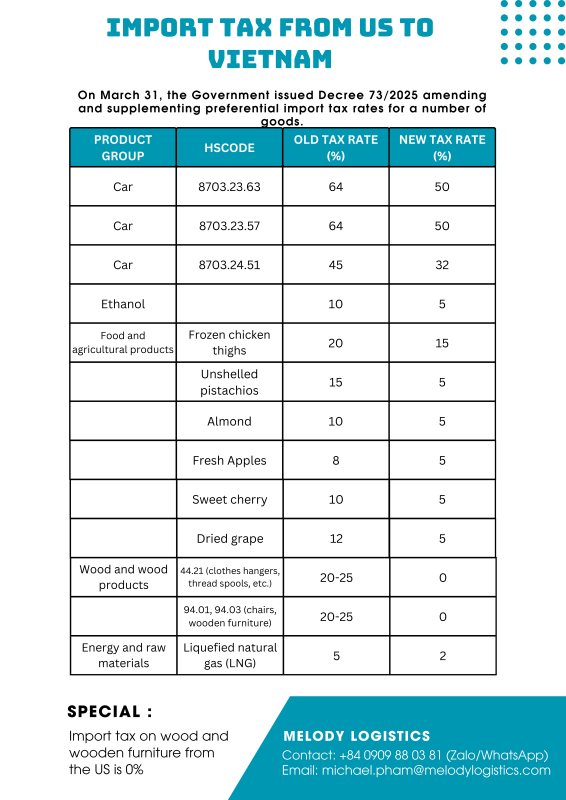Vietnam Reduces Import Tariffs on U.S. Wood to 0% - A Major Opportunity for the Wood Industry
On March 31, 2025, the Vietnamese government officially issued Decree 73/2025, adjusting and supplementing preferential import tax rates for various goods. This is a significant move in Vietnam’s trade policy, promoting trade and investment between Vietnam and the United States.
List of Goods with Reduced Import Tariffs

According to Decree 73/2025, several imported goods from the U.S. will have reduced import tariffs, including:
-
Automobiles: Reduced from 64% to 50% and from 45% to 32%.
-
Ethanol: Reduced from 10% to 5%.
-
Food and agricultural products:
-
Frozen chicken legs: Reduced from 20% to 15%.
-
Pistachios, almonds, fresh apples, cherries: Reduced from 8-15% to 5%.
-
-
Liquefied natural gas (LNG): Reduced from 5% to 2%.
-
Wood and wood products: Drastically reduced from 20-25% to 0%.
Major Benefits for Vietnam’s Wood Industry
Reducing import tariffs on wood and wood products from the U.S. to 0% will help domestic wood processing businesses lower material costs and enhance their competitiveness in the global market. The affected products include:
-
Clothes hangers
-
Thread spool cores
-
Chairs and chair components
-
Wooden furniture
This is excellent news for Vietnam’s wood processing industry, enabling businesses to utilize high-quality raw materials at lower costs, thereby boosting export capabilities.
Tariff Reduction - A Boost for U.S. Investment in Vietnam
- Lowering import tariffs not only helps balance trade with the U.S. but also facilitates American businesses investing in Vietnam. According to the Vietnam Timber and Forest Products Association (Viforest), U.S. wood imports have surged in recent years. In 2024, Vietnam imported $316.3 million worth of wood from the U.S., marking a 32% increase in volume and a 34% increase in value compared to 2023. This demonstrates the growing demand for U.S. wood materials.
- Besides tariff adjustments, Vietnam is expanding cooperation with the U.S. in technology and trade sectors. For instance, SpaceX has received approval to trial its Starlink satellite internet service in Vietnam, contributing to digitalization and economic development.
What Should Vietnam Do to Capitalize on This Opportunity?
-
According to Prof. Dr. Vo Xuan Vinh, Director of the Institute for Business Research (University of Economics Ho Chi Minh City), reducing import tariffs on U.S. goods is a strategic move to maintain stable trade relations with the U.S. However, to attract investment effectively, Vietnam needs to:
-
Simplify administrative procedures to attract U.S. capital.
-
Invest in modern infrastructure to support key industries.
-
Offer special incentives to attract major technology enterprises.
-
Support domestic businesses to enhance their global competitiveness.
-
Conclusion
-
Reducing U.S. wood import tariffs to 0% not only benefits Vietnam’s wood processing industry but also contributes to balancing trade and attracting U.S. investment. This is a crucial step in Vietnam’s international economic integration strategy, opening up sustainable development opportunities for the future.




 Tiếng Việt
Tiếng Việt